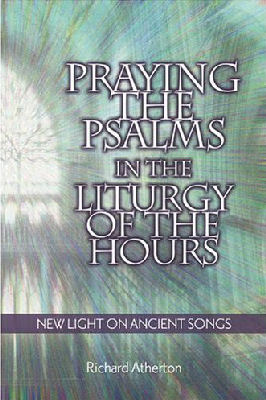
|
Posted August 31, 2007
Book: Praying the Psalms in the Liturgy of the Hours: New light on ancient songs Author: Richard Atherton Liguori, Ligurori, Missouri. 2007. Pp. 243 An Excerpt from the Jacket:
The first part of the book gives a brief general instruction on the various types of psalms. It speaks to how the psalms came about, who were the authors, traits commonly found throughout the psalms, their literary style, psalms as prayer, and even certain “pre-“ or “un-Christian” problems we find in the psalms. The second part deals individually with each of the psalms as they are included over the four weeks of the Liturgy of the Hours. (All the “hours” of the day are included.) The commentaries on each psalm are addressed primarily to the heart. They are intended to show how the psalms, written so long ago, can become rich and rewarding prayers for us today. One will receive the greatest profit by reading the psalm, then examining the commentary, then slowly praying the psalm once more. Anyone curious about the psalms will benefit from the simple approach the author takes in explaining each psalm and how to pray it. For those already accustomed to praying regularly with psalms, this book can deepen their appreciation of the Liturgy of the Hours. An Excerpt from the Book: Night Prayer After Evening Prayer I on Sundays and Solemnities Psalm 4: Confidence As another day draws to its close, the psalmist makes an act of trust in God. Past experience (from anguish you released me) shows that the Lord hears me whenever I call him and brings an assurance that he will once again have mercy and respond to prayer. He sees the startling contrast between his own happy lot and that of those whose hearts are closed to God but open to the pursuit of what is futile and false. If only they would reverence God, avoid sin, quietly reflect, pursue justice and have trust in the Lord (sts. 1-4) Everyone is seeking happiness, but the psalmist knows where it is to be found; and so he beg God t let his face, radiant with love, shine on us. He meditates on the greater joy that God has given him — more to be prized than material things, such as an abundance of corn and new wine, the fruits of the two Palestinian harvests – grain and grape — which is a conscience at peace and the ability to drop off to sleep, confident that you are in the keeping of one who spells perfect safety (sts. 5-7) In addition to the references to bedtime (sts. 4, 7), this psalm makes an ideal Night Prayer. It is good to look back on the day that has gone, thankful to God for goodness shown and favors granted, but also to be able to look forward to coming sleep with peaceful heart, knowing that we dwell in safety in the arms of a God who is with us through every darkness, including the darkness of sleep and with us through every darkness, including the darkness of sleep and even the darkness of death. Indeed, there is no greater joy than this. Table of Contents: Part I: Introducing the psalms The birth of th psalms The author of the psalms Family traits in the psalms The psalms are poetry The psalms – our prayers The problem psalms Part II: The four-week psalm cycle in the liturgy of the hours The daily recurring canticles and psalms Week 1 to week 4 and night prayer |
|
